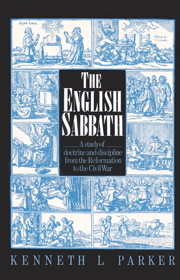Book contents
- Frontmatter
- Contents
- Acknowledgements
- Abbreviations
- 1 The case for a reappraisal
- 2 Medieval sabbatarianism and Reformation reaction
- 3 Early Elizabethan sabbatarianism: 1558–82
- 4 Late Elizabethan and Jacobean sabbatarianism: 1583–1617
- 5 The Book of Sports controversy: 1617–18
- 6 The 1620s: continued consensus
- 7 The sabbatarian controversy
- Epilogue
- Appendix
- Bibliography
- Index
3 - Early Elizabethan sabbatarianism: 1558–82
Published online by Cambridge University Press: 23 November 2009
- Frontmatter
- Contents
- Acknowledgements
- Abbreviations
- 1 The case for a reappraisal
- 2 Medieval sabbatarianism and Reformation reaction
- 3 Early Elizabethan sabbatarianism: 1558–82
- 4 Late Elizabethan and Jacobean sabbatarianism: 1583–1617
- 5 The Book of Sports controversy: 1617–18
- 6 The 1620s: continued consensus
- 7 The sabbatarian controversy
- Epilogue
- Appendix
- Bibliography
- Index
Summary
In 1636 Peter Heylyn finished his study of the early Elizabethan period by noting that ‘upon due search made, and full examination of all parties, we find no Lords day Sabbath in the book of Homilies: nor in any writings of particular men, in more than 33 years after the Homilies were published’. His conclusion has never been seriously tested, with studies of Sabbatarianism leaping from the Queen's Injunctions to the complaint literature of the 1570s. The search for theological developments starts with the Dedham Classis debates, and Nicholas Bownde's Doctrine of the Sabbath, published in 1595, is presented as the first published work on the morally binding nature of the fourth precept. It is already apparent that this was not the case. Indeed the study of early Elizabethan Sabbatarianism reveals that the Church promoted analogical and scholastic interpretations through its teaching and encouraged Sabbatarian rigorism in its discipline.
There were disputes between Church officials and disaffected precisionists; but these conflicts were over the institution of the Lord's day, holy days, the proper use of the Sabbath, and penalties to be exacted for sabbath abuses. However, this discord stemmed from differing views of Church authority and interpretations of scripture, and does not detract from the fundamental consensus on the divine imperative to observe one day in seven. This chapter will explore Sabbatarian developments in the Church from the Elizabethan settlement to the formation of the Dedham Classis in 1582, and in particular the Church's role in promoting Sabbatarian teaching and discipline.
- Type
- Chapter
- Information
- The English SabbathA Study of Doctrine and Discipline from the Reformation to the Civil War, pp. 41 - 91Publisher: Cambridge University PressPrint publication year: 1988



